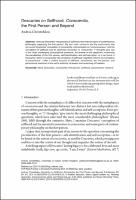Chapter Descartes on Selfhood, Conscientia, the First Person and Beyond
| dc.contributor.author | Christofidou, Andrea | |
| dc.date.accessioned | 2023-11-27T17:12:20Z | |
| dc.date.available | 2023-11-27T17:12:20Z | |
| dc.date.issued | 2023 | |
| dc.identifier | ONIX_20231127_9791221501698_2 | |
| dc.identifier.uri | https://library.oapen.org/handle/20.500.12657/85592 | |
| dc.description.abstract | I discuss Descartes’ metaphysics of selfhood, and relevant parts of contemporary philosophy regarding the first person. My two main concerns are the controversy that surrounds Descartes’ conception of conscientia, mistranslated as ‘consciousness’, and his conception of selfhood and its essential connection to conscientia. ‘I’-thoughts give rise to the most challenging philosophical questions. An answer to the questions concerning the peculiarities of the first person, self-identification and self-ascription, is to be found in Descartes’ notion of conscientia. His conception of selfhood insightfully informs his conception of personhood. I offer a unified account of selfhood, conscientia, the first person, and personhood anchored in the self’s authority of reason and autonomy of freedom. | |
| dc.language | English | |
| dc.relation.ispartofseries | Knowledge and its Histories | |
| dc.subject.other | René Descartes | |
| dc.subject.other | conscientia | |
| dc.subject.other | first person | |
| dc.subject.other | selfhood | |
| dc.subject.other | personhood | |
| dc.subject.other | freedom | |
| dc.title | Chapter Descartes on Selfhood, Conscientia, the First Person and Beyond | |
| dc.type | chapter | |
| oapen.identifier.doi | 10.36253/979-12-215-0169-8.03 | |
| oapen.relation.isPublishedBy | bf65d21a-78e5-4ba2-983a-dbfa90962870 | |
| oapen.relation.isbn | 9791221501698 | |
| oapen.series.number | 1 | |
| oapen.pages | 32 | |
| oapen.place.publication | Florence |

